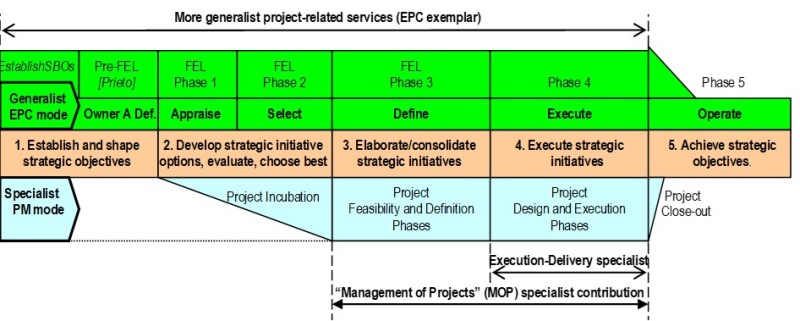to a more generalist role in an organisational strategic context
FEATURED PAPER
By Alan Stretton, PhD (Hon)
Sydney, Australia
INTRODUCTION
In the last issue of this journal (Stretton 2020a) I discussed both specialist project management (PM) and more generalist project-related contributors to organisational strategic management. These discussions were represented in summary form as illustrated in Figure 1 below.

Figure 1: Summarised representation of both specialist and generalist PM-related involvement in organisational strategic management stages (based on Stretton 2020a: Figure 8)
The two main types of specialist PM services represented in Figure 1 are Execution-Delivery-only, which is exampled by traditional tendering processes in the construction industry, and “Management of Projects” (a descriptor adopted from Morris 2013), which adds the management of the front-end phases of the project life-cycle, as represented in Figure 1 by the project feasibility and definition phases.
The more generalist project-related contributors, which are represented by the example of many EPC (Engineering, Procurement & Construction) organisations, are shown in the top section of Figure 1. This mode is represented by three FEL (Front End Loading) stages, which are often preceded by a pre-FEL stage. The latter is broadly concerned with what was described as helping “shape” the client’s organisational strategic objectives. It also often overlaps FEL, which is specifically concerned with assisting clients in determining the “right” project(s) to help achieve their organisational strategic objectives.
There are two particular points of difference between these specialist and generalist project-related services. The first is that the latter specifically includes helping clients determine the “right” projects – i.e. those that will best contribute to achieving their strategic objectives. This seldom happens with specialist Management of Projects (MOP). Such lack of involvement in helping choose the “right” project(s) is a severe constraint on just how effective such specialist PM services can be in the broader context of helping organisations achieve their strategic objectives.
The second point of difference is that pre-FEL activities are particularly concerned with helping “shape” the organisational strategic objectives, an area in which specialist MOP does not normally get involved.
In this article I am returning to discussions in previous articles in this journal on how specialist PM services provided by my old employer, Civil & Civic (C&C), were expanded to essentially include both of the above generalist attributes. However, this coverage will give more attention to a governance and participatory vehicle we introduced, which, amongst other benefits, greatly facilitated the expansion of these services. This vehicle was called a Project Control Group (PCG), which was originally introduced in relation to our design-and-construct services. We first discuss Civil & Civic’s move into the latter, then the nature of PCGs, and then the expansion of C&C’s services into the more generalised types of services, how PCGs facilitated this expansion, and broader possibilities for PCGs to help bridge some existing gaps between project management and general management.
FROM CONSTRUCTION ONLY, TO DESIGN-AND-CONSTRUCT
In an earlier article in this journal on expanding the scope of project management services in the construction industry (Stretton 2019c), I discussed how Civil & Civic got started In the building and construction industries in Australia in the early 1950s with “traditional” tendering, which I described in Stretton 2020a as the project execution-delivery specialisation. I then noted the concerns of the CEO of Civil & Civic, G. J. Dusseldorp, about how the counterproductive separation of design from construction denied clients the benefit of practical construction advice in the design planning stage; and the flawed financial incentive structure of the time, which encouraged architects to design edifices and prompted contractors to cut costs in any way they could – neither of which necessarily served the best interests of the client. As noted in Murphy 1984:7
He [Dusseldorp] came to realise that the important cost-savings on any building project are to be made on the drawing board, and set out to promote the concept on which the present day organisation has been built: the acceptance of undivided responsibility for any project from start to finish.
From the mid-to-late 1959s, Civil & Civic (C&C) appointed its own “project engineers” (i.e. project managers) to manage the design phases of all its own development projects, as well as quality control of construction.
More…
To read entire paper, click here
How to cite this paper: Stretton, A. (2020). Extending specialist PM services to a more generalist role in an organisational strategic context; PM World Journal, Volume IX, Issue II, February. Available online at https://pmworldlibrary.net/wp-content/uploads/2020/01/pmwj90-Feb2020-Stretton-extending-specialist-PM-services.pdf
About the Author

Alan Stretton, PhD
Faculty Corps, University of Management
and Technology, Arlington, VA (USA)
Life Fellow, AIPM (Australia)
![]()
Alan Stretton is one of the pioneers of modern project management. He is currently a member of the Faculty Corps for the University of Management & Technology (UMT), USA. In 2006 he retired from a position as Adjunct Professor of Project Management in the Faculty of Design, Architecture and Building at the University of Technology, Sydney (UTS), Australia, which he joined in 1988 to develop and deliver a Master of Project Management program. Prior to joining UTS, Mr. Stretton worked in the building and construction industries in Australia, New Zealand and the USA for some 38 years, which included the project management of construction, R&D, introduction of information and control systems, internal management education programs and organizational change projects. He has degrees in Civil Engineering (BE, Tasmania) and Mathematics (MA, Oxford), and an honorary PhD in strategy, programme and project management (ESC, Lille, France). Alan was Chairman of the Standards (PMBOK) Committee of the Project Management Institute (PMI®) from late 1989 to early 1992. He held a similar position with the Australian Institute of Project Management (AIPM), and was elected a Life Fellow of AIPM in 1996. He was a member of the Core Working Group in the development of the Australian National Competency Standards for Project Management. He has published over 200 professional articles and papers. Alan can be contacted at alanailene@bigpond.com.au.
To see more works by Alan Stretton, visit his author showcase in the PM World Library at http://pmworldlibrary.net/authors/alan-stretton/.









